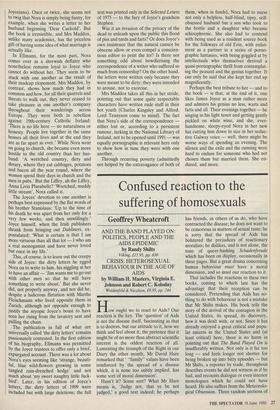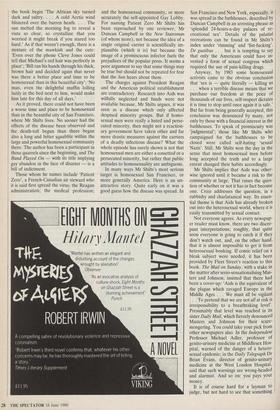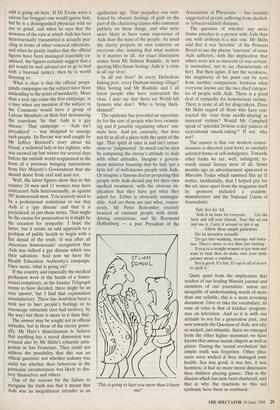Confused reaction to the suffering of homosexuals
Geoffrey Wheatcroft
AND THE BAND PLAYED ON: POLITICS, PEOPLE AND THE AIDS EPIDEMIC by Randy Shills
Viking, £15.95, pp. 630
CRISIS: HETEROSEXUAL BEHAVIOUR IN THE AGE OF AIDS by William H. Masters, Virginia E. Johnson and Robert C. Kolodny
Weidenfeld & Nicolson, £9.95, pp. 244
How ought we to react to Aids? Our reaction is the key. The `question' of Aids is not the disease itself, fascinating as that is to doctors, but our attitude to it, how we think and feel about it; the pretence that it might be of no more than abstract scientific interest is the oddest reaction of all. Lamenting the triumph of the Right in our Diary the other month, Mr David Hare remarked that ' "family" values have been reinforced by the spread of a disease which, it is none too subtly implied, has some sort of moral dimension'.
Hasn't it? Some sort? What Mr Hare means is, 'Judge not, that ye be not judged,' a good text indeed; he perhaps has friends, as others of us do, who have contracted the disease; he does not want to be censorious in matters of sexual taste; he is sorry that the spread of Aids has bolstered the prejudices of reactionary moralists; he dislikes, and is not alone, the tone of queer-bashing Schadenfreude which has been on display, occasionally in these pages. But a great drama concerning human behaviour must have a moral dimenkon, and so must our reaction to it.
That includes the reactions to these two books, coming to which late has the advantage that their reception can be considered. Pretending that Aids has no- thing to do with behaviour is not a mistake that Mr Shilts makes. His book tells the story of the arrival of the contagion in the United States, its spread, its discovery, how it was dealt with, or not. Since it has already enjoyed a great critical and popu- lar success in the United States and (at least critical) here, there is no harm in pointing out that The Band Played On is insufferably written. Not only is it far too long — and feels longer not shorter for being broken up into bitty episodes — but Mr Shilts, a reporter by trade, throughout describes events he did not witness as if he had, and recounts dialogue or even interior monologues which he could not have heard. He also suffers from the Meteorolo- gical Obsession. Three random sections of the book begin 'The African sky turned dark and sultry. . . . A cold Arctic wind blistered over the barren heath. . . . The sun melted the morning fog to reveal a vista so clear, so crystalline that you worried it might break if you stared too hard.' As if that weren't enough, there is a mixture of the mawkish and the cute: `Even over the phone Cleve Jones could tell that Michael's red hair was perfectly in place'; 'Bill ran his hands through his thick, brown hair and decided again that never was there a better place and time to be homosexual than in this beautiful city'; 'No man, even the delightful muffin lolling lazily in the bed next to him, would make him late for this day of all days.'
As it proved, there could not have been a worse time and place to be homosexual than in the beautiful city of San Francisco, where Mr Shilts lives. No sooner had the effects of the disease been observed and the death-toll begun than there began also a long and bitter squabble within the large and powerful honfosexual community there. The author has been a participant in those quarrels since the beginning, and The Band Played On — with its title implying gay abandon in the face of disaster — is a bill of indictment.
Those whom he names include 'Patient Zero', a French-Canadian air steward who it is said first spread the virus; the Reagan administration; the medical profession; and the homosexual community, or more accurately the self-appointed Gay Lobby. For naming Patient Zero Mr Shilts has been reproached by one reviewer, Mr Duncan Campbell in the New Statesman (of whom more), not because the idea of a single original carrier is scientifically im- plausible (which it is) but because the image of a promiscuous infector fuels the prejudices of the popular press. It seems a poor argument to say that some things may be true but should not be repeated for fear that the Sun hears about them.
The charges against President Reagan and the American political establishment are contradictory. Research into Aids was wilfully neglected and funds were not available because, Mr Shilts argues, it was seen as a disease which only affected despised minority groups. But if homo- sexual men were really a hated and perse- cuted minority, then might not a reaction- ary government have taken other and far more drastic measures against the carriers of a deadly infectious disease? What the whole episode has surely shown is not that homosexual men are either a cossetted or a persecuted minority, but rather that public attitudes to homosexuality are ambiguous.
In many ways Mr Shilts's most serious target is homosexual San Francisco, or more generally America. Here is an un- attractive story. Quite early on it was a good guess how the disease was spread. In San Francisco and New York, especially, it was spread in the bathhouses, described by Duncan Campbell in an arresting phrase as `splendid 24-hours-a-day palaces of re- creational sex'. Details of the palatial recreations can be found in Mr Shilts's index under 'rimming' and `fist-fucking'. De gustibus . . . but it is tempting to say that only the Americans could have in- vented a form of sexual congress which required the use of pain-killing drugs.
Anyway, by 1983 some homosexual activists came to the obvious conclusion that 'sex is — quite literally — killing us . . . when a terrible disease means that we purchase our freedom at the price of thousands of our lives, self-respect dictates it is time to stop until once again it is safe.' But far from being generally accepted, this conclusion was denounced by many, not only by those with a financial interest in the bathhouses. To speak of promiscuity was `judgmental'; those like Mr Shilts who campaigned for the bathhouses to be closed were called self-hating 'sexual Nazis'. Still, Mr Shilts won the day in the sense that most homosexual men before long accepted the truth and to a large extent changed their habits accordingly.
Mr Shilts implies that Aids was other- wise ignored until it became a risk to the community at large. That raises the ques- tion of whether or not it has in fact become one. Crisis addresses the question, in a rubbishy and charlatanical way. Its essen- tial theme is that Aids has already broken out into the heterosexual world, where it is easily transmitted by sexual contact.
Not everyone agrees. As every newspap- er reader must know, there are two discre- pant interpretations; roughly, that quite soon everyone is going to catch it if they don't watch out, and, on the other hand, that it is almost impossible to get it from heterosexual bonking. If comic relief on a bleak subject were needed, it has been provided by Fleet Street's reaction to this book. The Mail on Sunday, with a stake in the matter after serio-sensationalising Mas- ters and Johnson, insisted that there had been a cover-up: 'Aids is the equivalent of the plague which ravaged Europe in the Middle Ages . . . We must all be vigilant . . . To pretend that we are not all at risk is irresponsibility to a breathtaking level'. Presumably that level was reached in its sister Daily Mail, which fiercely denounced Masters and Johnson for their scare- mongering. You could take your pick from other newspapers also. In the Independent Professor Michael Adler, professor of genito-urinary medicine at Middlesex Hos- pital, warned of the danger of a hetero- sexual epidemic; in the Daily Telegraph Dr Brian Evans, director of genito-urinarY medicine at the West London Hospital, said that such warnings are wrong-headed and alarmist. And so on: you pays your money. It is of course hard for a layman to judge, but not hard to see that something odd is going on here. If Dr Evans were a saloon bar braggart one would ignore him, but he is a distinguished physician with no axe to grind, and when he says that the slowness of the rate at which Aids has been heterosexually transmitted is actually puz- zling in terms of other venereal infections, and when he gently implies that the official figures have been massaged (carefully ex- amined, the figures certainly suggest that a girl would be well advised not to go to bed with a bisexual junky), then he is worth listening to.
What is clear is that the official propa- ganda campaigns on the subject have been misleading to the point of mendacity. More than a year ago came the first campaign, at a time when any mention of the subject in the Commons would have a group of Labour Members on their feet denouncing the scurrilous 'lie that Aids is a gay disease'. That campaign — 'Aids isn't Prejudiced' — was designed to assuage such people. Its flavour was well caught by Mr Jeffrey Bernard's story about his friend, a widowed lady in her eighties, who was snowed up last winter for several days before the outside world reappeared in the form of a postman bringing instructions from Her Majesty's Government that she should desist from oral and anal sex.
Well, the latest figures show that in this country 24 men and 11 women may have contracted Aids heterosexually, as against 597 homosexual men. You scarcely need to be a professional statistician to see that Aids is a 'gay disease' and that it is prejudiced, in just those terms. That might be the excuse for persecution or it might be the occasion for sympathy. I hope the latter, but it seems an odd approach to a problem of public health to begin with a flat denial of the truth. It was after all American homosexuals' recognition that Aids was indeed a gay disease which was their salvation. And now we have the Health Education Authority's campaign. Once more, what is going on?
If the country and especially the medical profession were in the hands of a homo- sexual conspiracy, as the Sunday Telegraph seems to have decided, there might be an easy answer, but I find that explanation unsatisfactory. There has doubtless been a wish not to hurt people's feelings or to encourage ostracism (not bad motives, by the way) but there is more to it than that.
The answer may be sought not in official attitudes, but in those of the clerisy gener- ally. Mr Hare's disinclination to believe that anything has a moral dimension was evinced also by Mr Shilts's sybaritic anta- gonists in San Francisco. They could not address the possibility that this was an ethical question: not whether sodomy was sinful but whether their behaviour in the particular circumstances was likely to des- troy themselves and others.
One of the reasons for the failure to recognise the truth was that it meant that Aids was an inegalitarian intruder in an egalitarian age. That prejudice was rein- forced by obscure feelings of guilt on the part of the chattering classes who comment publicly on these things, and who were more likely to have some experience of Aids than the mass of the people. As usual the clerisy projects its own concerns on everyone else, insisting that what matters to it matters to all. An exact illustration comes from Mr Salman Rushdie, in turn quoting Miss Susan Sontag: Aids is 'a crisis in all our lives'.
In all our lives? In every Hebridean fishing port, every Durham mining village? Miss Sontag and Mr Rushdie and I all know people who have contracted the virus. I dare say that there are Welsh hill farmers who don't. Who is being thick- skinned?
The epidemic has provided an opportun- ity for the sort of people who love examin- ing and if possible regulating others' inti- mate lives. And yet, curiously, that does not fit in all of a piece with the spirit of the age. That spirit at once is and isn't censo- rious or 'judgmental'. So much can be seen by comparing the clerisy's attitude to Aids with other attitudes. Imagine a govern- ment minister boasting that he had 'got a little list' of well-known people with Aids. Or imagine a famous doctor proposing that people with Aids should pay for their own medical treatment, with the obvious im- plication that they have got what they asked for. Either is obviously unimagin- able. And yet those are just what, respec- tively, Mr Peter Bottomley recently boasted of eminent people with drink- driving convictions, and Sir Raymond Hoffenberg — a past President of the 'This is going to hurt you more than it hurts me!' Association of Physicians — has recently suggested of people suffering from alcohol- or tobacco-related diseases.
The question of whether any more blame attaches to a person with Aids than one with cirrhosis is a nice one. Mr Shilts said that it was 'horrible' of the Princess Royal to use the phrase 'innocent' of some Aids sufferers, with the implication that others were not so innocent (it was certain- ly insensitive, not to say characteristic of her). But then again, if not the weakness, the singularity of his point can be seen from another comparison: between what everyone knows are the two chief categor- ies of people with Aids. There is a good deal of sympathy for homosexual victims. There is none at all for drug-takers. Does Mr Shifts regard all those who have con- tracted the virus from needle-sharing as innocent victims? Would Mr Campbell speak of 'splendid 24-hour-a-day palaces of recreational smack-taking'? If not, why not?
The answer is that our modern censor- iousness is directed (and how) at carefully selected forms of self-indulgence. Towards other forms we are, well, indulgent; to- wards sexual licence most of all. Some months ago an advertisement appeared in Marxism Today which summed this up (I notice, incidentally, that I helped pay for the ad, since apart from the magazine itself its sponsors included a condom- manufacturer and the National Union of Journalists):
`Safe Sex for All.
`Aids is an issue for everyone . . . Get the facts and tell your friends. Tear this ad out and use it. Carry it around or pin it up.
. . . follow these simple guidelines.
'Do be inventive sexually.
'Do get into wanking, massage and fanta- sies. There's more to sex than just fucking.
'If you're a straight woman or gay man and want to fuck then do make sure your male partner wears a condom . . .
'Sex is good. It's fun. It's up to all of us not to spoil it.'
Quite apart from the implication that readers of our leading Marxist journal and members of our journalists' union are incapable of understanding words of more than one syllable, this is a most revealing document. Give or take the vocabulary, its tone of voice is that of kiddies' program- mes on television. And so it is with our attitude to sex for a generation past, and now towards the Question of Aids: not silly or wicked, just infantile. Since we emerged from the other higher mammals we have known that amour meant chagrin as well as plaisir. During the 'sexual revolution' this simple truth was forgotten. Other plea- sures were wicked if they damaged your health. Sex was good, it was fun, it was harmless; it had no more moral dimension than children playing games. That is the illusion which has now been shattered, and that is why the reactions to this sad epidemic have been so confused.




















































 Previous page
Previous page